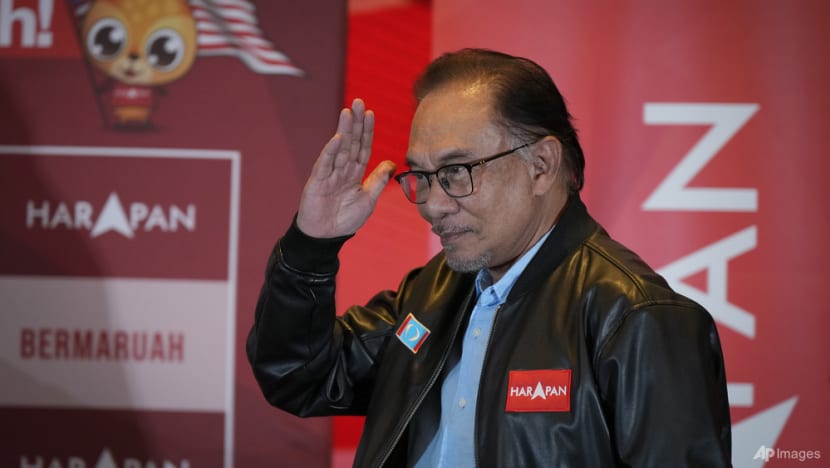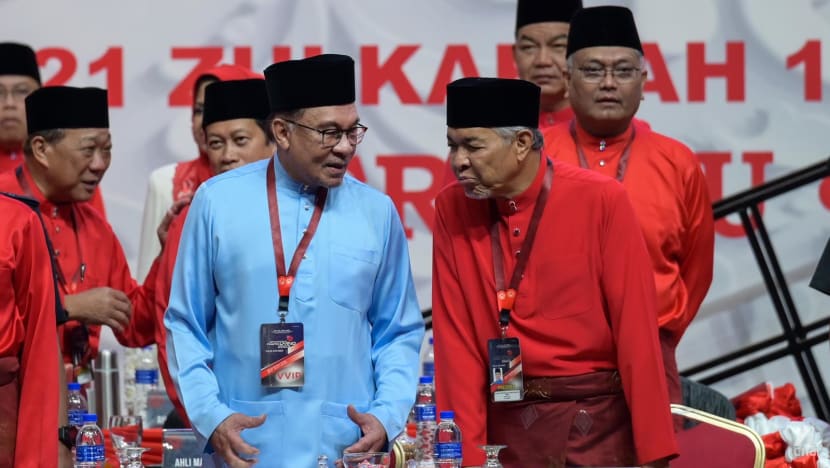Commentary: Malaysia PM Anwar stakes his political prestige in upcoming state polls
Malaysia Prime Minister Anwar Ibrahim is taking a high-stakes political gamble by turning the upcoming state polls into a referendum of his seven-month premiership that is anchored on multiracialism. It is a gambit that carries both potential and risk, says CNA’s Leslie Lopez.

KUALA LUMPUR: Malaysia Prime Minister Anwar Ibrahim is making the upcoming six state assembly elections personal.
While the polls on Aug 12 have been widely framed as a barometer of the level of support from the Muslim Malay community for the prime minister’s unity government, Mr Anwar is taking a different tact, presenting them as a referendum on his seven-month premiership that is anchored on multiracialism and a civil society, better known as Malaysia Madani.
Mr Anwar, Malaysia’s 10th prime minister since independence in 1957, is asking Malaysians, particularly the Malays who make up more than 60 per cent of the country’s 33.6 million people, to break away from the politics of race and religious rhetoric that he insists have failed Malaysia.
He wants voters to deliver a message that would signal their backing for a new multiracial political compact championed by his fledgling administration, which is led by his Pakatan Harapan (PH) coalition.
It is a big ask, particularly at a time when the opposition Malay parties are doubling down on claims that the community is at risk of losing their political clout, which could result in economic marginalisation. What is more, Mr Anwar’s opponents are arguing that multiculturalism is a direct threat to the status of Islam as the country’s official religion.
Mr Anwar’s loudest opponent for a new Malaysia is Dr Mahathir Mohamad, who dominated Malaysian politics for decades. Dr Mahathir, who turned 98 this week, was Malaysia’s prime minister from 1981 to 2003, and again from 2018 to 2020.
.png?itok=0S2LzgZM)
BATTLE FOR VOTES
Dr Mahathir has been courting the country’s two main opposition Malay parties, Parti Islam Se-Malaysia (PAS) and Parti Pribumi Bersatu Malaysia (Bersatu), to back his so-called Malay Proclamation, a 12-page document that outlines strategies to safeguard the interests of the Malay community with the principal aim of uniting the Malays to regain political power.
The Malay-based parties have vowed to work together in the upcoming state polls, but have so far been non-committal to Dr Mahathir’s Malay Proclamation agenda to avoid alienating non-Malays voters.
To be sure, the upcoming polls in Selangor, Negeri Sembilan, Penang, Kedah, Kelantan and Terengganu, roughly half of the states that constitute Malaysia, will not change the power equation at the national level where Mr Anwar’s PH coalition government controls an overwhelming majority in Parliament.
But there are nagging questions about Mr Anwar’s mandate, particularly over the support he enjoys with the Malay community.
The results of the November general election were inconclusive and Mr Anwar only became prime minister after the United Malays National Organisation (UMNO) threw its support behind the PH leader, a move that prompted other parties follow suit and paved the way for the formation of a strong unity government, which for the first time in history is led by a coalition made up of multi-racial parties in both make-up and ideology.
The opposition Perikatan Nasional (PN) coalition, comprising PAS and Bersatu, controls 74 seats in the 222-member Parliament.
FRUSTRATION WITH POLITICS
Mr Anwar’s close advisors noted that a strong showing by PH coalition partners in the upcoming state polls will provide the prime minister with a mandate to push ahead with his reform agenda and also show that the stylings of a multiracial Malaysia, which is the cornerstone of his national agenda, is taking hold.
A poor performance on the other hand would suggest that Malaysian politics will remain trapped in the rhetoric of race and religion and continue to be a drag on the national economic fortunes.
Before the dissolution of the six state assemblies in recent weeks, Selangor, Negeri Sembilan and Penang were under PH administrations, while PAS led Kedah, Kelantan and Terengganu.
Politicians and analysts are divided over how the Malays will vote in the upcoming polls, underscoring the deep social changes in a fractured community that has become increasingly frustrated with the political process.
“Malay consciousness has changed and the community is no longer homogenous or ideological as in the past. Performance matters and they want a leadership they can relate to, something that is humbler and readier to fix problems,” noted Ibrahim Suffian of private polling agency Merdeka Center.
Echoing a widely held view, Mr Ibrahim noted the August state polls are unlikely to follow the pattern that emerged in the inconclusive November general election when Malays voters, frustrated with corruption and the weak leadership in the long established UMNO, threw their support behind PAS and Bersatu.
“What is clear is that many voters, particularly the younger set, turned to the PN coalition as a form of protest against UMNO. The Malay ground is impatient and how the parties’ campaign will set the tone,” he said.
Malaysia's political woes can be traced to the deep malaise in UMNO, which dominated coalition administrations that ruled Malaysia for more than six decades since independence in 1957, a record unmatched by any elected government in power.
But the party, long the favoured political entity for the majority of the Malays, began to lose its appeal because of leadership power struggles that began in the late 1990s and rampant corruption in government aimed largely at financing UMNO’s deeply entrenched patronage power structure.
When UMNO and the Barisan Nasional coalition that it leads lost power in 2018 due to deep splits in the Malay community, the delicate racial balance that had long ensured political stability in Malaysia was disturbed.
Since 2018, UMNO’s national political footprint has shrunk dramatically and the party controls only 26 seats in Malaysia’s 222-member parliament. On the other hand, its Malay rivals that dominate the opposition PN coalition collectively occupy 74 seats.
“The big issue for Malaysia is to win back the investment premium it long enjoyed for having political stability. Once the country has that, the outlook will change positively very quickly,” said Manu Bhaskaran, chief executive officer at Centennial Asia Advisors.

ANWAR’S RISKY POLITICAL GAMBIT
Mr Anwar’s political gambit carries a number of risks. Chief among them is the ties with UMNO, which even the prime minister’s closest advisors acknowledge is a burden for the PH coalition.
The prospects for UMNO are not looking good in the upcoming state polls.
Riven by factional disputes, due to widespread unhappiness over the leadership of party president Ahmad Zahid Hamidi and a public image blighted by corruption changes facing its leaders, UMNO faces an existential crisis. Younger Malays are also finding it hard to connect with a party that is still campaigning for the release of its jailed leader, former prime minister Najib Razak, who is now serving a 12-year jail sentence following his conviction on corruption charges.
“Ten of the eleven people I speak to tell me that UMNO will be decimated and I think it is a fair summation,” said Abdul Azim Zabidi, the party's former treasurer who has now retired from politics.
UMNO is not the only Malay based party facing challenges. PAS and Bersatu, which benefited from the anti-UMNO sentiment in the November polls, are also facing challenges in courting the increasingly fickle Malay ground.
“PN has somewhat lost its appeal because all it can do is harp on the PH government’s failure to deliver. They are not offering solutions,” said Merdeka’s Mr Ibrahim.
Political analysts generally expect the status quo to remain in Kelantan and Penang, which is led by the Democratic Action Party, a senior component member in PH. But the other states could produce surprises depending on how the dominant Malay community decides.
Mahfuz Omar, the vice president of Parti Amanah Negara (Amanah) that is part of the PH coalition, said that Kedah - which PH component parties lost narrowly in the contest for parliamentary seats in November - could produce an upset in favour of Mr Anwar’s allies.
“The anti-UMNO wave that swept in favour of PN in the November GE (general election) is no longer there and all we need is a 10 per cent voter swing to wrest control of Kedah,” he told CNA, adding that the PAS-led state government has failed in managing the state, which has an 80 per cent Malay majority.
A win in Kedah and strong victories in the PH controlled states would give Mr Anwar the mandate that he seeks. Anything else is likely to keep Malaysia trapped in its protracted political funk.
Leslie Lopez is a senior correspondent at CNA Digital who reports on political and economic affairs in the region.



















